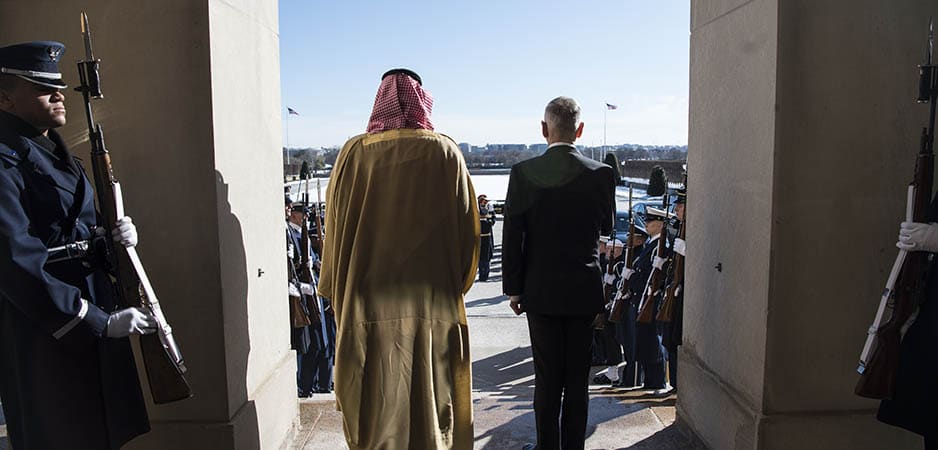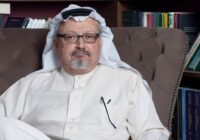Contrary to his hopes and expectations that the world might eventually forget if not forgive, Mohammed bin Salman still appears to have a journalist’s blood on his hands, according to the UN’s special rapporteur.
The sleepwalking Lady Macbeth pertinently observed in a text that Saudi Crown Prince Mohammed bin Salman (MBS) might be wise to study and meditate: “All the perfumes of Arabia will not sweeten this little hand.”
Things are hotting up again for MBS, as UN Special Rapporteur Agnes Callamard concludes that “credible evidence” points to the crown prince as the person who ordered the assassination of Saudi journalist Jamal Khashoggi. Already designated by the CIA as the instigator of the journalist’s death, the UN report goes further in its account of the known details and reaches the same conclusion.
Before the publication of Callamard’s report, Mohammed bin Salman attempted to reassure the international community, continuing to proclaim his innocence and announcing that “those accused of carrying out the crime are government officials.” He added the promise that the Saudi government would “achieve full justice and accountability, without getting distracted by positions taken by some for their own domestic considerations that are known to everyone.”
Here is today’s 3D definition:
Distract:
The reprehensible act of finding a way to divert attention away from a convenient lie constantly repeated by a powerful and influential person towards the formulation of an inconvenient truth
Contextual note
Mohammed bin Salman has consistently felt that Turkey and its president, Recep Tayyip Erdoğan, have been out of order in their zeal to determine the facts behind Khashoggi’s murder at the Saudi Consulate in October 2018, on the absurd pretext that the events took place in Istanbul on Turkish soil. Everyone knows Erdoğan runs an authoritarian regime, which allows him to use the law and his executive powers to settle affairs at his own convenience, in particular in stifling dissent. In August 2018, The New York Times summed up its own disillusion with Erdoğan: “He has jailed journalists, seized the assets of political opponents and crushed dissent while amassing complete control over the levers of Turkish power.”
MBS may have been asking himself the question: How could the Turkish president fail to show not only tolerance, but also respect for the crown prince when he does similar things? Does a despot have the right to take the moral high ground over a tyrant to the point of accusing him of a crime? MBS certainly went too far for most people’s taste, with the possible exception of US President Donald Trump’s family, cabinet and advisers. But elementary psychology should have taught him that conducting one’s crimes in another leader’s territory is by definition risky, if only because that person may be seen as an accomplice. Technically a consulate is the territory of the foreign state, but a murder and its coverup cannot take place without planning and executing complex actions in the consulate’s surroundings.
The crown prince appears to know what power is and how it can be deployed, but he doesn’t seem to understand how it is managed. Impressed by the unconditional support of the Trump administration and the fact that he has the president’s son-in-law, Jared Kushner, “in his pocket,” MBS may have missed his tutor’s geopolitical lesson on the distribution of power and influence in the eastern Mediterranean, where Turkey just happens to be a regional power that has played a frequently decisive role in the affairs of Asia and Europe. By compromising his own authority through a blatantly criminal action conducted on Turkey’s home ground, MBS offered Erdoğan what could literally be called a “trump card” — that embarrasses Trump as well as weakening and potentially undermining Saudi dominance in the region. It’s an opportunity that the resourceful Erdoğan wasn’t about to pass up.
Now the affair has reached a higher level, the United Nations, which has only moral power, but that may be enough to turn the tables on MBS as well as upset some of Trump’s rapidly unraveling schemes for the Middle East. Not because the International Criminal Court may take up the case, but because all eyes have turned toward Washington, to find out how the administration will react.
Historical note
The high-level friendship between the US and Saudi Arabia dates back to President Franklin D. Roosevelt. Though there have been a few moments of relative tension, their relationship has never wavered, not even after a group of Saudis, funded by Saudi sources, flew commercial airliners into strategic targets in the US on September 11, 2001. Historians have noted that the petroleum resources of the Arabian Peninsula may have played a more significant role in this long-lasting friendship than cultural affinity or shared political values.
That tradition has even affected the reporting of today’s news. Whereas Al Jazeera headlines that MBS “should be investigated over [the] killing of journalist Khashoggi” and The Guardian similarly announces “‘Credible evidence’ Saudi crown prince liable for Khashoggi killing,” CBS News in the US is careful to specify in its first paragraph that the “investigator stopped short of blaming bin Salman directly for the murder, but said the state of Saudi Arabia was responsible.” That appears to leave the Trump administration enough wiggle room to continue to take the position that nothing has been proved and the Saudis will determine who the culprits were.
The CBS article includes a clip of a February 13 interview with Secretary of State Mike Pompeo, former director of the CIA. When the journalist asks whether he believes the agency’s assessment of the likelihood of MBS’ guilt, Pompeo responds by saying, “That’s a ridiculous question.” When further challenged on Trump’s hesitation to call out the crown prince, Pompeo explains: “We have an important relationship with Saudi Arabia. We are determined to make that a successful relationship” before promising to take a position “as the facts are developed.” Interestingly, he expects the facts not to be revealed, but “developed,” which makes sense, since the Saudis have been consistently developing or fabricating new facts ever since the assassination became news.
In all this, no one seems to have noticed a curious historical fact. Fifteen of the 19 hijackers responsible for the 9/11 attacks were Saudi citizens. The team sent to murder Jamal Khashoggi in Istanbul consisted of 15 Saudis. Can this be a simple coincidence? And is there no one ready to construct a convincing conspiracy theory around the number 15… just as a distraction?
*[In the age of Oscar Wilde and Mark Twain, another American wit, the journalist Ambrose Bierce, produced a series of satirical definitions of commonly used terms, throwing light on their hidden meanings in real discourse. Bierce eventually collected and published them as a book, The Devil’s Dictionary, in 1911. We have shamelessly appropriated his title in the interest of continuing his wholesome pedagogical effort to enlighten generations of readers of the news.]
The views expressed in this article are the author’s own and do not necessarily reflect Fair Observer’s editorial policy.
Support Fair Observer
We rely on your support for our independence, diversity and quality.
For more than 10 years, Fair Observer has been free, fair and independent. No billionaire owns us, no advertisers control us. We are a reader-supported nonprofit. Unlike many other publications, we keep our content free for readers regardless of where they live or whether they can afford to pay. We have no paywalls and no ads.
In the post-truth era of fake news, echo chambers and filter bubbles, we publish a plurality of perspectives from around the world. Anyone can publish with us, but everyone goes through a rigorous editorial process. So, you get fact-checked, well-reasoned content instead of noise.
We publish 2,500+ voices from 90+ countries. We also conduct education and training programs
on subjects ranging from digital media and journalism to writing and critical thinking. This
doesn’t come cheap. Servers, editors, trainers and web developers cost
money.
Please consider supporting us on a regular basis as a recurring donor or a
sustaining member.
Will you support FO’s journalism?
We rely on your support for our independence, diversity and quality.






